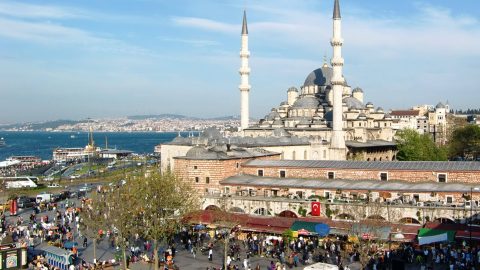Turkish early elections to be held on 1 November, 2015; and once more, the market is waiting for a positive outcome. Neither the country nor the market has more tolerance to absorb any further political uncertainty; however, the election outcome may not be too different from the results back in June 2015. Nevertheless, this time Turkey is closer to a coalition government.
As a reminder: on 7 June 2015, Turkish parliamentary elections generated 40.9% of votes for AKP (governing party Justice and Development), followed by CHP (Republican People’s Party) with 25.0%, MHP (Nationalistic Movement Party) with 16.3%, and HDP (People’s Democratic Party) with 13.1%. Meanwhile, the average of the recent polls conducted indicates some minor changes for AKP at 42%, CHP at 27.3%, and HDP at 12.4%. But this outcome would still not be enough for AKP to form a single party government. That being said, this time the likelihood of the successful formation of a new government is bigger than before, given that the uncertain political environment affects all parties equally across the board. In this scenario, a coalition of AKP with the main opposition party CHP is highly probable. We think it would be very hard for AKP to form a coalition with HDP or MHP after consecutive terrorist attacks which killed almost 200 people in a couple of months. Besides, the head of MHP has stated at several occasions that the party is not willing to be part of any coalition, especially after the terrorist attacks.
Worst-case scenario: no coalition and again a repeat of the election
If the parties failed to form a coalition government, Turkey would have to repeat the election again – but from our point of view, this is an unlikely scenario. However, if it were to materialise, it would come with high economic costs, and it would be detrimental to the markets. It is also important to note that Turkey did not have a coalition government since 2001, as AKP was the only ruling party. The coalition of course may lead to another period of uncertainty, with the capital markets concerned over who is going to replace the existing MPs and economy officials.
The formation of a coalition would have a positive impact
If a coalition government were successfully formed, the “2.5 years election cycle” would have come to an end, which would reduce the political risk in the country. The election period and related uncertainties have cost Turkish assets a lot: the MSCI Turkey index currently trades at 9.2 x 12M forward earnings estimate, which is 18% below the Price/Earnings-ratio of 11.3x of the MSCI EM index.
Of course, even after the formation of a possible coalition government, we will have to wait at least until February 2016 to see some structural reforms and a new budget as the current temporary government has limited power when it comes to introducing economic reforms or passing a budget. However, a new government based on a coalition would remove uncertainty which currently puts weigh on the Turkish capital markets.
Legal disclaimer
This document is an advertisement. Unless indicated otherwise, source: Erste Asset Management GmbH. The language of communication of the sales offices is German and the languages of communication of the Management Company also include English.
The prospectus for UCITS funds (including any amendments) is prepared and published in accordance with the provisions of the InvFG 2011 as amended. Information for Investors pursuant to § 21 AIFMG is prepared for the alternative investment funds (AIF) administered by Erste Asset Management GmbH pursuant to the provisions of the AIFMG in conjunction with the InvFG 2011.
The currently valid versions of the prospectus, the Information for Investors pursuant to § 21 AIFMG, and the key information document can be found on the website www.erste-am.com under “Mandatory publications” and can be obtained free of charge by interested investors at the offices of the Management Company and at the offices of the depositary bank. The exact date of the most recent publication of the prospectus, the languages in which the fund prospectus or the Information for Investors pursuant to Art 21 AIFMG and the key information document are available, and any other locations where the documents can be obtained are indicated on the website www.erste-am.com. A summary of the investor rights is available in German and English on the website www.erste-am.com/investor-rights and can also be obtained from the Management Company.
The Management Company can decide to suspend the provisions it has taken for the sale of unit certificates in other countries in accordance with the regulatory requirements.
Note: You are about to purchase a product that may be difficult to understand. We recommend that you read the indicated fund documents before making an investment decision. In addition to the locations listed above, you can obtain these documents free of charge at the offices of the referring Sparkassen bank and the offices of Erste Bank der oesterreichischen Sparkassen AG. You can also access these documents electronically at www.erste-am.com.
Our analyses and conclusions are general in nature and do not take into account the individual characteristics of our investors in terms of earnings, taxation, experience and knowledge, investment objective, financial position, capacity for loss, and risk tolerance. Past performance is not a reliable indicator of the future performance of a fund.
Please note: Investments in securities entail risks in addition to the opportunities presented here. The value of units and their earnings can rise and fall. Changes in exchange rates can also have a positive or negative effect on the value of an investment. For this reason, you may receive less than your originally invested amount when you redeem your units. Persons who are interested in purchasing units in investment funds are advised to read the current fund prospectus(es) and the Information for Investors pursuant to § 21 AIFMG, especially the risk notices they contain, before making an investment decision. If the fund currency is different than the investor’s home currency, changes in the relevant exchange rate can positively or negatively influence the value of the investment and the amount of the costs associated with the fund in the home currency.
We are not permitted to directly or indirectly offer, sell, transfer, or deliver this financial product to natural or legal persons whose place of residence or domicile is located in a country where this is legally prohibited. In this case, we may not provide any product information, either.
Please consult the corresponding information in the fund prospectus and the Information for Investors pursuant to § 21 AIFMG for restrictions on the sale of the fund to American or Russian citizens.
It is expressly noted that this communication does not provide any investment recommendations, but only expresses our current market assessment. Thus, this communication is not a substitute for investment advice.
This document does not represent a sales activity of the Management Company and therefore may not be construed as an offer for the purchase or sale of financial or investment instruments.
Erste Asset Management GmbH is affiliated with the Erste Bank and austrian Sparkassen banks.
Please also read the “Information about us and our securities services” published by your bank.

